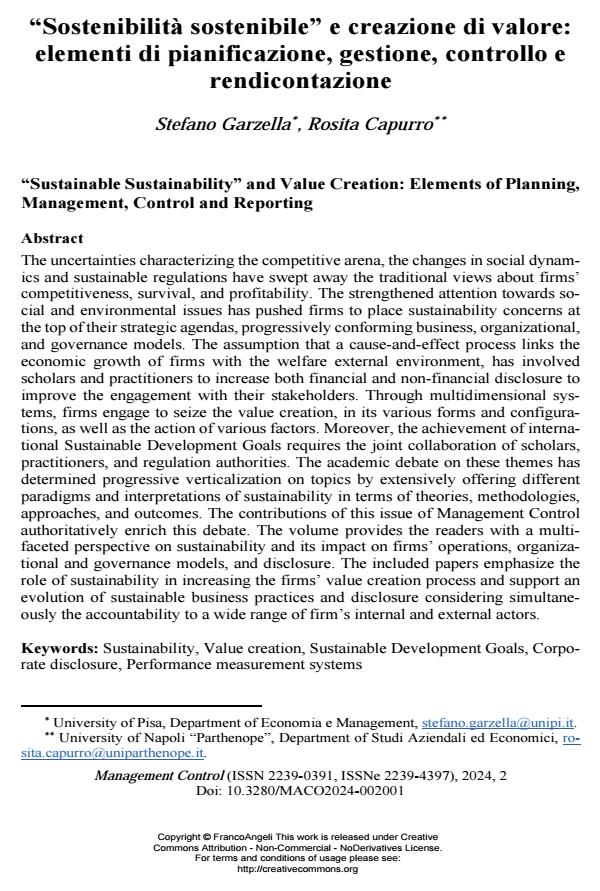“Sustainable Sustainability” and Value Creation: Elements of Planning, Management, Control and Reporting
Journal title MANAGEMENT CONTROL
Author/s Stefano Garzella, Rosita Capurro
Publishing Year 2024 Issue 2024/2
Language Italian Pages 10 P. 5-14 File size 177 KB
DOI 10.3280/MACO2024-002001
DOI is like a bar code for intellectual property: to have more infomation
click here

FrancoAngeli is member of Publishers International Linking Association, Inc (PILA), a not-for-profit association which run the CrossRef service enabling links to and from online scholarly content.
The uncertainties characterizing the competitive arena, the changes in social dy-namics and sustainable regulations have swept away the traditional views about firms’ competitiveness, survival, and profitability. The strengthened attention to-wards social and environmental issues has pushed firms to place sustainability concerns at the top of their strategic agendas, progressively conforming business, organizational, and governance models. The assumption that a cause-and-effect process links the economic growth of firms with the welfare external environment, has involved scholars and practitioners to increase both financial and non-financial disclosure to improve the engagement with their stakeholders. Through multidimensional systems, firms engage to seize the value creation, in its various forms and configurations, as well as the action of various factors. Moreover, the achievement of international Sustainable Development Goals requires the joint collaboration of scholars, practitioners, and regulation authorities. The academic debate on these themes has determined progressive verticalization on topics by extensively offering different paradigms and interpretations of sustainability in terms of theories, methodologies, approaches, and outcomes. The contributions of this issue of Management Control authoritatively enrich this debate. The volume provides the readers with a multi-faceted perspective on sustainability and its im-pact on firms’ operations, organizational and governance models, and disclosure. The included papers emphasize the role of sustainability in increasing the firms’ value creation process and support an evolution of sustainable business practices and disclosure considering simultaneously the accountability to a wide range of firm’s internal and external actors.
Keywords: Sustainability, Value creation, Sustainable Development Goals, Corpo-rate disclosure, Performance measurement systems
- Becoming a Benefit Corporation in the Cosmetics Industry. An Italian case study Gail Denisse Chamochumbi Diaz, Federica Palazzi, Massimo Ciambotti, in MANAGEMENT CONTROL 3/2026 pp.15
DOI: 10.3280/MACO2025-003002 - Digital Twins nei Sistemi Portuali e il contributo di GHG accounting: Una review della letteratura Assunta Di Vaio, Sabrina Palladino, Elisa Van Engelenhoven, in MANAGEMENT CONTROL 1/2025 pp.211
DOI: 10.3280/MACO2025-001010 - Sustainability strategies and stakeholder relationships: A multiple case study in the fashion industry Roberto Cerchione, Rosita Capurro, Stefano Marciano, in MANAGEMENT CONTROL 2/2025 pp.13
DOI: 10.3280/MACO2025-002002
Stefano Garzella, Rosita Capurro, “Sostenibilità sostenibile” e creazione di valore: elementi di pianificazione, gestione, controllo e rendicontazione in "MANAGEMENT CONTROL" 2/2024, pp 5-14, DOI: 10.3280/MACO2024-002001